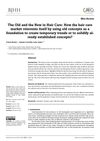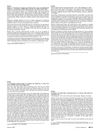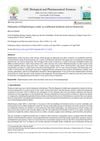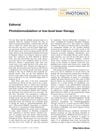January 2011 in “Liaoning Zhongyiyao Daxue xuebao” The traditional Chinese medicine treatment improved symptoms and was more effective for SLE patients.
 57 citations,
August 2003 in “British Journal of Dermatology”
57 citations,
August 2003 in “British Journal of Dermatology” Minoxidil and pyrithione zinc combo most effectively increases hair density.
 January 2024 in “Brazilian Journal of Hair Health”
January 2024 in “Brazilian Journal of Hair Health” Modern hair care trends often reinvent old practices to create new trends or reinforce existing ones.

Hair loss causes emotional distress, leading to high spending on treatments, with Minoxidil and Propecia being common but having side effects.
 February 2007 in “Journal of The American Academy of Dermatology”
February 2007 in “Journal of The American Academy of Dermatology” Hair tonic helps stop hair loss in most users.
 159 citations,
December 2007 in “American Journal of Pathology”
159 citations,
December 2007 in “American Journal of Pathology” Stress-related substance P may lead to hair loss and negatively affect hair growth.
 9 citations,
January 1966 in “Economic botany”
9 citations,
January 1966 in “Economic botany” Plant-based ingredients in hair care are being replaced by synthetic alternatives.
 November 2023 in “International journal of Ayurveda and pharma research”
November 2023 in “International journal of Ayurveda and pharma research” The herbal hair oil effectively promotes hair growth, nourishes the scalp, and prevents dandruff.
 January 2025 in “International Journal of Advanced Research in Science Communication and Technology”
January 2025 in “International Journal of Advanced Research in Science Communication and Technology” Polyherbal hair dyes are safer and more eco-friendly than chemical dyes.
 4 citations,
September 2020 in “Annals of Translational Medicine”
4 citations,
September 2020 in “Annals of Translational Medicine” Concentrated nanofat helps mice grow hair by activating skin cells and may be used to treat hair loss.
 November 2024 in “Journal of Natural Remedies”
November 2024 in “Journal of Natural Remedies” Herbal ingredients can effectively promote hair growth and improve hair health.
 9 citations,
October 2011 in “Journal of proteomics”
9 citations,
October 2011 in “Journal of proteomics” Taxol damages hair growth cells, causing hair loss.
 6 citations,
October 2017
6 citations,
October 2017 Indian Gooseberry has potential for cancer prevention and treatment and promotes hair growth.
 December 2021 in “Journal of clinical images and medical case reports”
December 2021 in “Journal of clinical images and medical case reports” PRP generally shows better results for hair regrowth than mesotherapy, but more research is needed.
 38 citations,
December 2011 in “Journal of Dermatology”
38 citations,
December 2011 in “Journal of Dermatology” Use minoxidil for hair loss treatment, and finasteride for men.

Adding a zygomaticotemporal nerve block reduces pain more effectively during hair regrowth treatments.
 8 citations,
April 2020 in “Facial Plastic Surgery Clinics of North America”
8 citations,
April 2020 in “Facial Plastic Surgery Clinics of North America” Follicular Unit Transplantation is a reliable hair restoration method with a high success rate and minimal scarring.
 3 citations,
April 2021 in “GSC Biological and Pharmaceutical Sciences”
3 citations,
April 2021 in “GSC Biological and Pharmaceutical Sciences” Elephantopus scaber has many health benefits, including antibacterial, antifungal, anticancer, and antioxidant properties.
 67 citations,
November 2019 in “Molecules”
67 citations,
November 2019 in “Molecules” Tea, especially green tea, shows promise in cosmetics for skin and hair benefits but more research is needed for effective use.
 25 citations,
August 2021 in “Irish Journal of Medical Science (1971 -)”
25 citations,
August 2021 in “Irish Journal of Medical Science (1971 -)” COVID-19 infection can significantly cause temporary hair loss.
 December 2021 in “International journal of minor fruits, medicinal and aromatic plants”
December 2021 in “International journal of minor fruits, medicinal and aromatic plants” The document concludes that in Sri Lanka, 25 common plants are traditionally used as home remedies for various health issues due to their medicinal properties.
 1 citations,
October 1984 in “Clinics in dermatology”
1 citations,
October 1984 in “Clinics in dermatology” People distressed by minor skin changes should consult dermatologists with cosmetic expertise, and a public Cosmetic Dermatology Service with mental health support is recommended.
34 citations,
January 2022 in “Molecules/Molecules online/Molecules annual” Natural ingredients in cosmeceuticals are beneficial for skin and hair health with few side effects.
 9 citations,
July 2021 in “Journal of Natural Medicines”
9 citations,
July 2021 in “Journal of Natural Medicines” Over 150 new molecules with biological activities were found in traditional herbal medicines, some with potential for new drug development.
 February 2023 in “Journal of Ginseng Research/Journal of ginseng research”
February 2023 in “Journal of Ginseng Research/Journal of ginseng research” New ginseng compounds may help treat degenerative diseases.
September 2021 in “Authorea (Authorea)” Systemic lupus erythematosus caused severe abdominal issues in a Sudanese woman.
182 citations,
November 2018 in “Cosmetics” Seaweeds have beneficial compounds for skin care, including anti-aging and protective effects.
 160 citations,
December 2016 in “Journal of biophotonics”
160 citations,
December 2016 in “Journal of biophotonics” Low-level laser therapy, now called photobiomodulation, is recognized for its broad medical applications and scientific backing.
 February 1938 in “Journal of the American Medical Association”
February 1938 in “Journal of the American Medical Association” Washing can prevent cancer from lubricating oils, extreme body temperatures need more study, Sulfomid is not recognized, no reliable diphtheria carrier treatment except surgery, eyelid injuries should heal before repair, heterophile antibody test is specific for mononucleosis, chlorine inhalations for colds are outdated, and wheat germ is safe.
 108 citations,
November 2006 in “The Milbank Quarterly”
108 citations,
November 2006 in “The Milbank Quarterly” Drug advertising has greatly increased, changing consumer behavior and raising concerns about its influence on healthcare and patient protection.

























